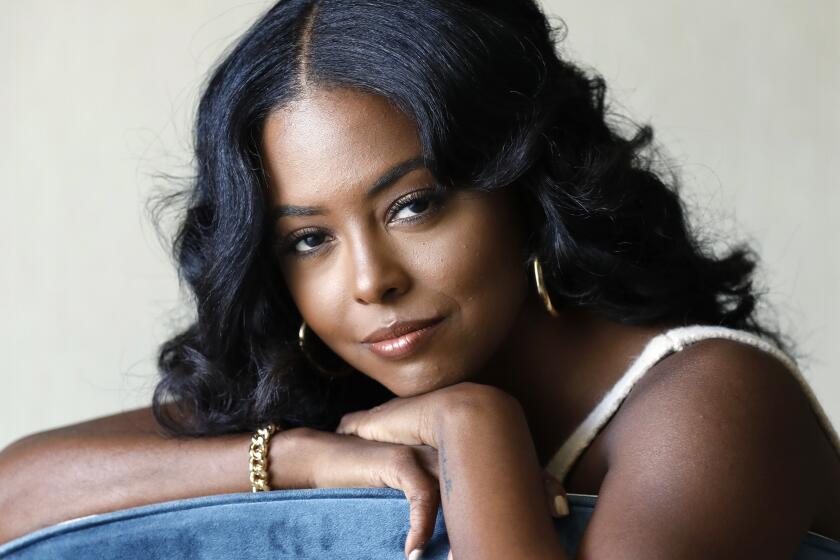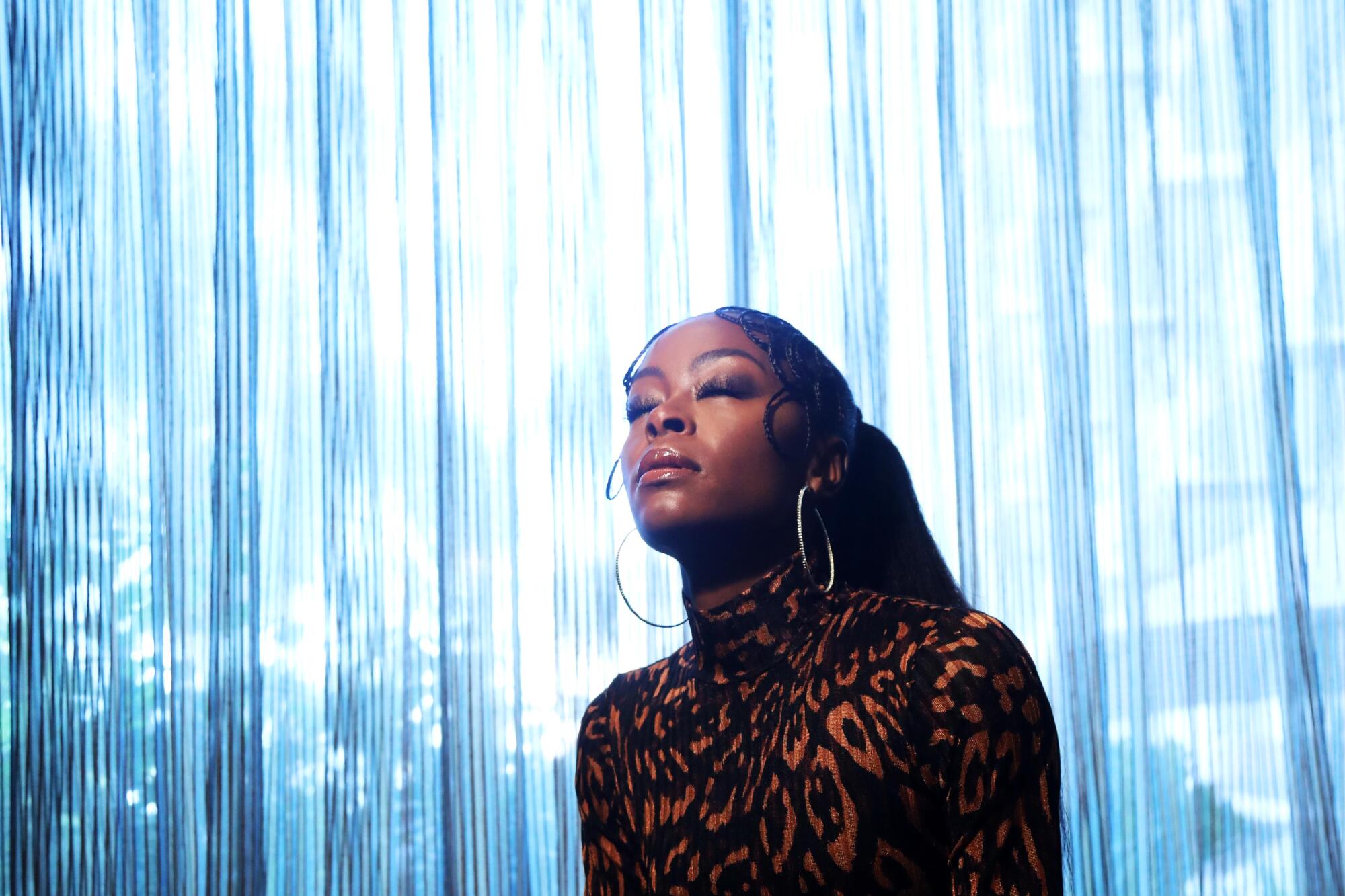
- Share via
Danielle Deadwyler vividly recalls what went through her mind when she learned that she had landed the lead role in “Till,” a new film centered on civil rights advocate Mamie Till-Mobley and her fight for justice following the brutal slaying of her son Emmett Till in the Jim Crow South.
She was excited. Until she wasn’t.
“There was only a split second to be joyful,” Deadwyler recalled. “I have the job and the honor, but also the responsibility. I know that responsibility deeply because I am a child of the South. I was anxious and nervous.”
The Atlanta-based actor was sitting in a Beverly Hills hotel the day before the Los Angeles debut of “Till,” which has scored rave reviews since its world premiere this month at the New York Film Festival. Her heartbreaking yet determined performance as a mother who refuses to be broken despite her unspeakable grief is already drawing awards-season buzz.
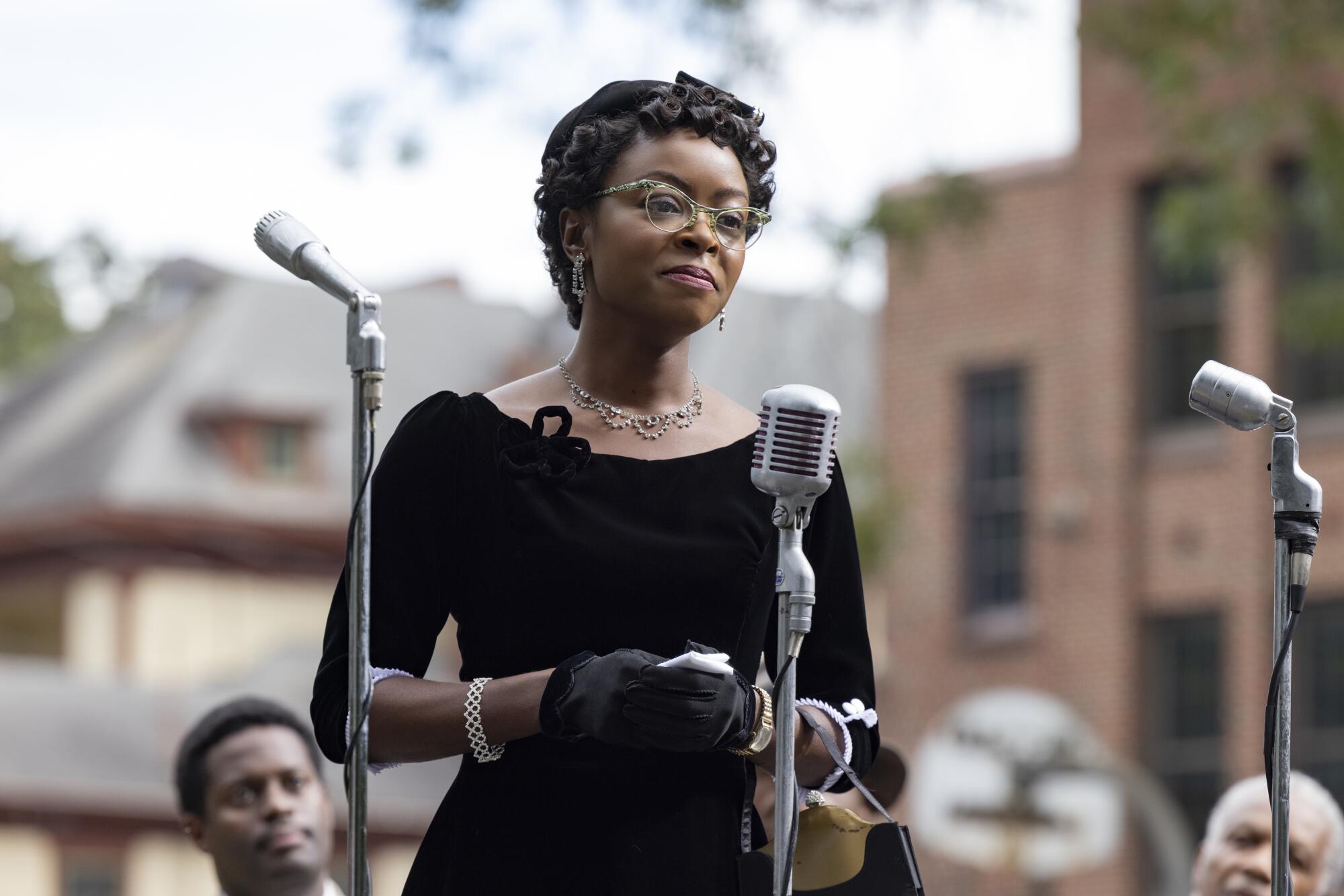
“Till” will likely mark a major turning point for Deadwyler, who had already been singled out in recent years for her featured roles in Netflix’s revisionist western “The Harder They Fall” and HBO Max’s post-apocalyptic drama “Station Eleven.”
As for Deadwyler, she draws thematic parallels between “Till” and 2019’s “The Devil to Pay,” in which she plays a woman living in the Appalachian Mountains who has to fight to protect her young son after she winds up in the middle of a blood feud between two warring families. She was a producer as well as the star of the low-budget independent film, in which she appeared alongside her real-life son, Ezra Haslam.
“There’s something about the tenderness of children, and less so about me being connected to these maternal experiences,” said Deadwyler. “It’s the desire to protect our children. When I became a mother, that became the biggest thing that laid over me. I have a son, I have a child, and I have to protect him to the utmost. Those things speak to me —the preservation of the spirit of kids and their lightheartedness.”
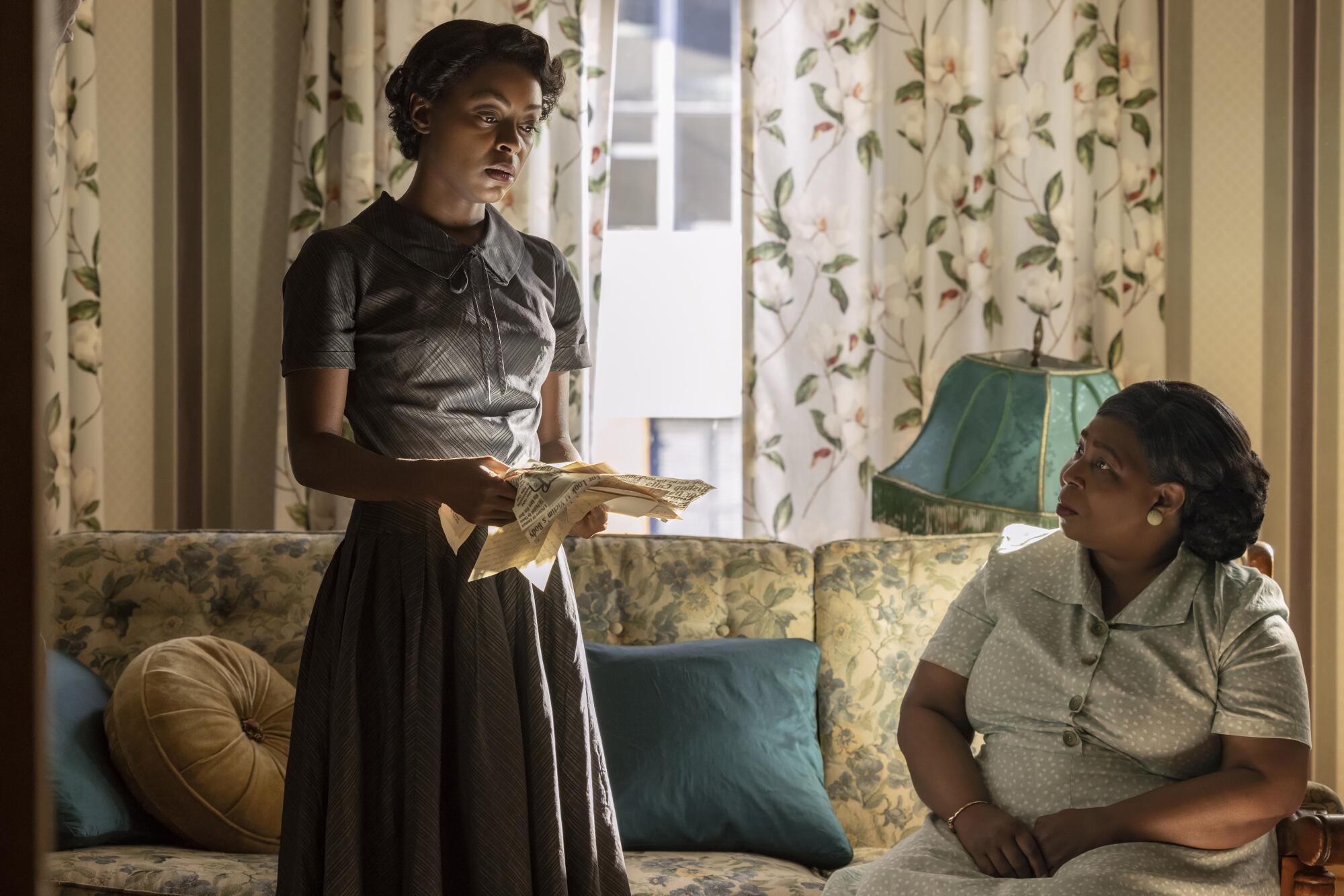
Among those singing the praises of Deadwyler’s performance are Whoopi Goldberg, who plays Mobley’s mother, Alma Carthan, and “Till” director Chinonye Chukwu.
“I’ve never seen anything like it,” Goldberg, who is one of the film’s executive producers, said of Deadwyler’s performance. “It’s mind-blowing, one of those once-in-a-lifetime things... This doesn’t happen often. And when it does, your mouth is on the floor. That girl is beyond beyond. That’s how I feel about it.”
Added Chukwu, “When I cast actors, particularly leading actors, I tend to look at whether they can communicate a story with their eyes. Can they get underneath it in between the words, can they hold and command a screen without saying a word? Danielle checked all of the boxes and knocked it out of the park.”
The slaying of 14-year-old Till in 1955 galvanized the country and the nascent civil rights movement, which gained national prominence in the 1950s and 1960s. The Chicago youth was kidnapped and killed after he was accused of whistling at a white woman in a grocery store while visiting relatives in Mississippi. Till-Mobley authorized Jet magazine to publish pictures of her son’s brutalized body. Thousands attended his funeral in Chicago, during which he was seen in an open casket.
Although the story of Emmett’s killing and Mamie’s unwavering courage has been largely overlooked by Hollywood for nearly 70 years, “Till” is the second major project to be centered on the pair to appear this year.
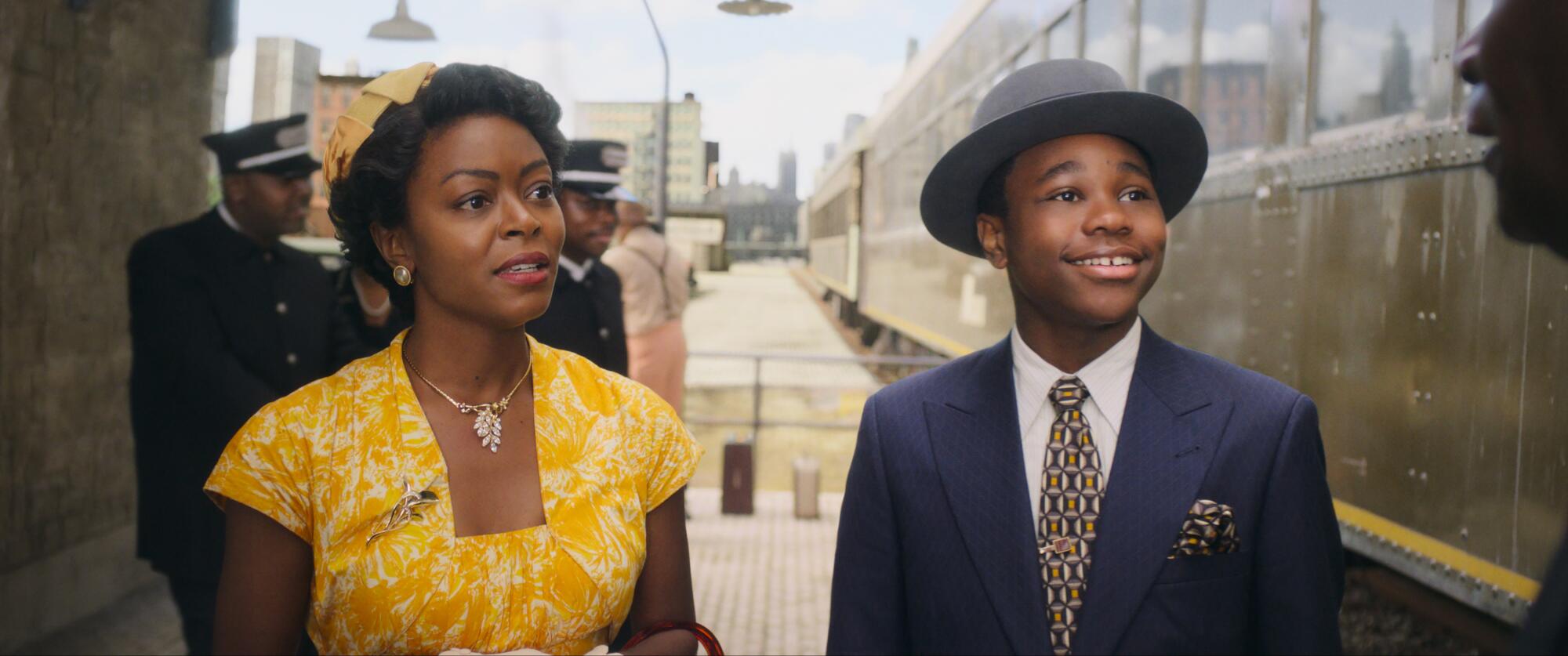
The first, “Women of the Movement,” premiered in January on ABC and starred Tony Award winner Adrienne Warren (“Tina: The Tina Turner Musical”) as Mamie Till-Mobley. Despite extensive promotion and an executive producer roster that included Shawn “Jay-Z” Carter, Will Smith and director Gina Prince-Bythewood (“The Woman King”), the limited series was a ratings disappointment.
“Till” will likely fare better because of the acclaim surrounding Deadwyler’s portrayal. But the actor is not entirely comfortable with all the attention she’s getting.
“I can’t hide out anymore,” she said with a laugh. “I was really trying to. The pandemic is not over. But this is one of those projects that needs talking about. People need to express how they feel, and I guess I got to be out there.”
She also addressed her tight bond with Jayln Hall, who plays Emmett; her process of honoring Mamie; and finding strength in the music of gospel legend Mahalia Jackson.
Chinonye Chukwu’s portrait of Mamie Till-Mobley, mother of the slain Emmett Till, shows much of the same intelligent restraint as her 2019 drama, ‘Clemency.’
“Till” has been getting such a terrific response at festivals and screenings. What were your expectations about how the film would be received?
I didn’t expect anything. It’s an emotional, overwhelming experience. People are having crying fits, having to leave the theater and come back in. It really speaks to what it means to be a Black mother in America. I’m trying my best, along with Chinonye, to maintain an emotional equilibrium and make space for everyone to have the reaction they need to have. I don’t read reviews, but I understand good things are being said.
How familiar were you with the story of Mamie and Emmett before you got involved with the project?
I’ve known this story since I was in elementary school. I knew the same images as everyone else — the black-and-white image in Jet magazine, the images of Mamie grieving, wailing. It happened in 1955. That’s the year my mother came into the world and the year we lost Emmett. It’s the conundrum of life and death.
Do you remember your reaction when you first read the script?
When I completed it, I knew this was the real deal. I thought about, “What does it take to do something like this?” It’s a major f— weight, it’s the mother lode.
How did you prepare to take on such a difficult role?
In pre-production, Chinonye and I went over every beat of the script, over and over and over, getting to the heart of what it meant to be the public Mamie and the private Mamie. I had been thinking about the public and private labor of Black women for a real long time. This is the epitome of it. People don’t understand the humanity and the intimacy of the experience of someone who has to carry that kind of symbolism. There was a lot of anxiety and tension-building, because that’s the essence of the role from beginning to end.
‘Women of the Movement’ is the rare scripted drama to examine Emmett Till’s 1955 killing — and mother Mamie Till-Mobley’s unwavering fight for justice.
There is a real and believable chemistry between you and Jayln Hall, who plays Emmett.
He’s a sweetheart, funny and joyful. He was 14 when we were filming, the same age as Emmett. I taught him how to sing that Dizzy Gillespie song “He Beeped When He Shoulda Bopped,” which was one of Emmett’s favorites. Of course, that’s not Jayln’s era. We do this scene with the song, and at the end, he had the audacity to say, “Miss Danielle, I just want to tell you that you have a beautiful smile.” That’s the joy and charisma of a young Black boy, the same way Emmett was. We had an immediate connection.
One of the most heartbreaking scenes in the film is when Mamie first sees Emmett’s body in the funeral home. What was it like for you the day you shot that scene?
I remember it was raining. We were at a house on the east side of Atlanta that had been transformed for the movie into the funeral home. It was quiet. There was an on-set therapist as part of the production so that everyone felt supported. Everyone there was feeling the same things with me. That day, everyone in the camera department was wearing white shirts and ties. I knew immediately that they were there in solidarity and honoring the moment. I didn’t see the body on the table until the first take. It was a charged morning. We all lived in the quietude, the emotion of the moment.
In that scene, Mamie had to have a private moment in the home because she didn’t want people to take it away from her. That scene is about Mamie humanizing her son. She is stepping in like a scientist, but along the way, she is recognizing him. His mouth, his smile, his eyes. It helps us to understand the humanity beyond the violence.
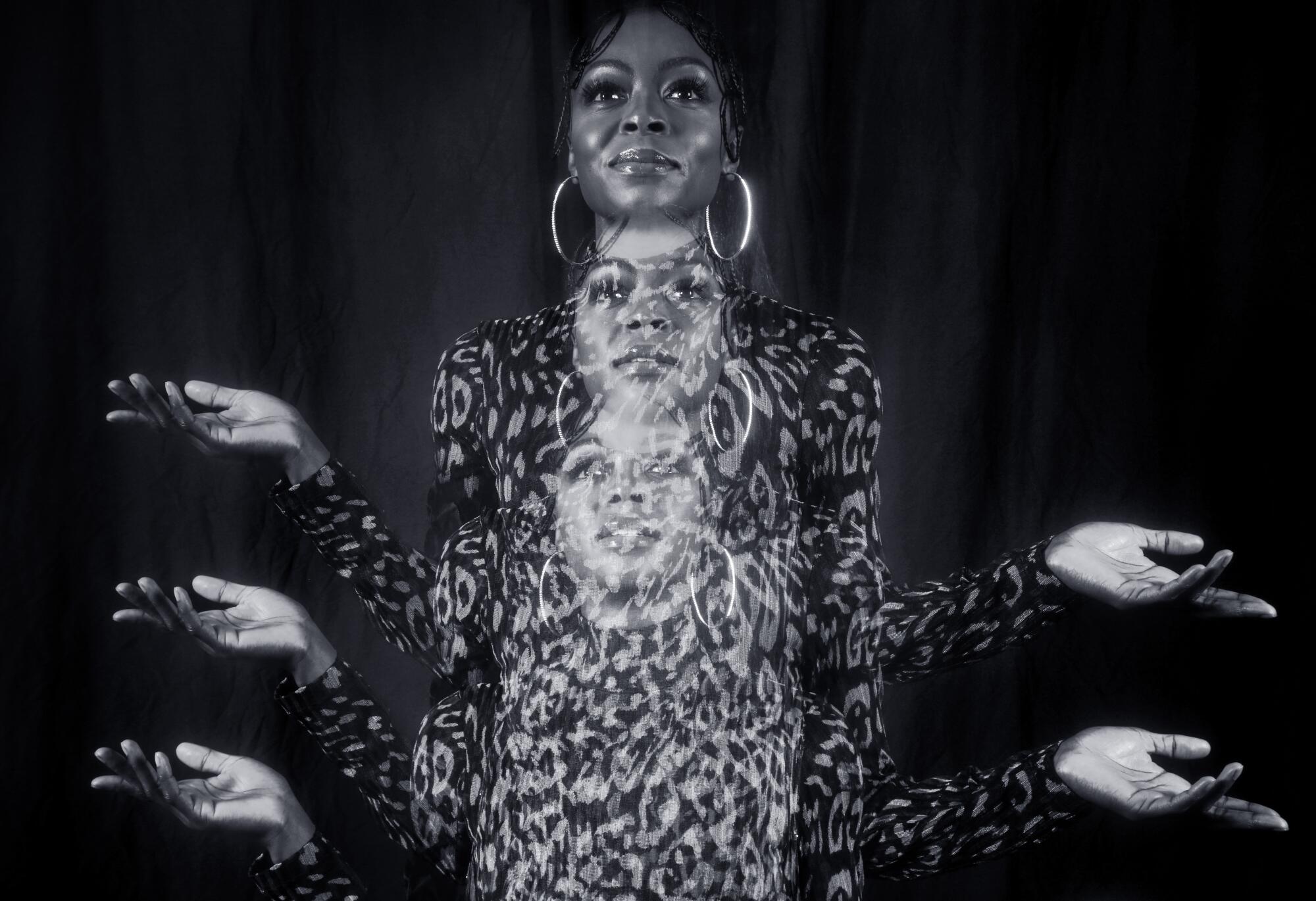
Doing this film must have been extremely intense. What was it like for you when you were not on the set or coming and going to the set?
My driver, Juan Hooker, who picked me up every day, took great care of me. I knew I wanted to hear certain gospel songs. So he played Mahalia Jackson every time I got in the car. We learned the entire Mahalia Jackson catalog together. Mahalia got me through it. He’d have her on in the morning, and it was like we were going to serve. He’d drive me when I was in costume during filming, and it was like we were going to serve. But on days that were my Fridays, we’d play jazz or R&B on the way home.
You must be proud of the film. Does it meet your goal of what you hoped to accomplish?
The family came on the set. So there was a drive to get it right every single day. I think we did that. But it doesn’t stop with the filming. Tens of thousands of people showed up to witness what happened to Emmett. Now, we have to witness again, but we must do it with the care and diligence of Mamie. We are witnessing Black bodies being killed today. We have to take the responsibility of understanding why Mamie did what she did, and how that has moved us in the direction of civil rights advocacy for Black folks, Asian and Latino people, queer people, women’s rights. All of that is interlocking and intersecting. Oppressed people should be joining together to eradicate racism and disenfranchisement of all people.
More to Read
Only good movies
Get the Indie Focus newsletter, Mark Olsen's weekly guide to the world of cinema.
You may occasionally receive promotional content from the Los Angeles Times.

